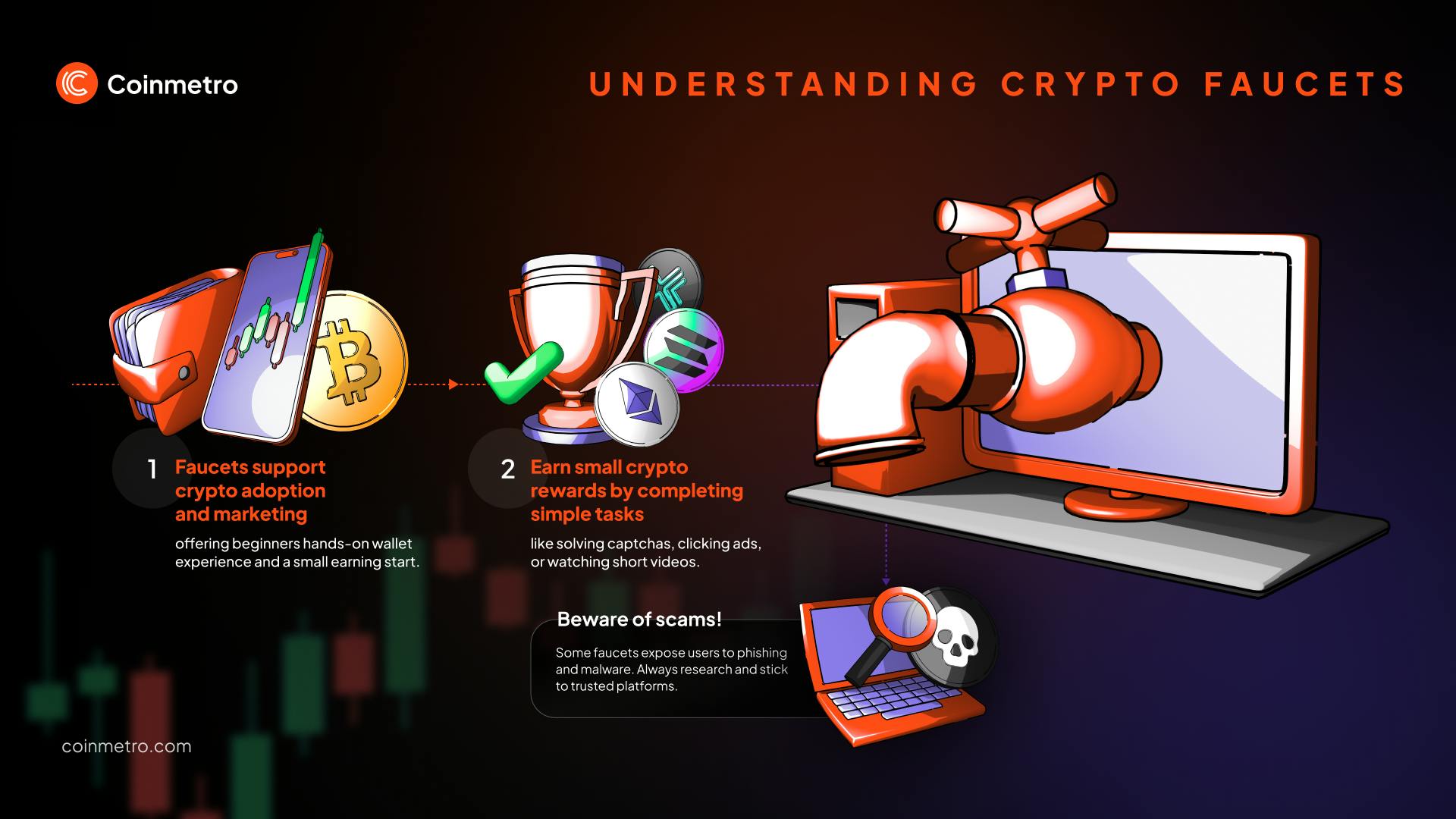Crypto Faucets: Are They Still Worth Your Time?
5 de diciembre de 2025

by Coinmetro Editorial Team
5 de diciembre de 2025
Crypto faucets are platforms that give away small amounts of cryptocurrency to users for completing simple tasks. These tasks often include solving captchas, clicking on ads, playing games, or watching videos. The primary goal of these faucets is to introduce new users to cryptocurrencies and encourage broader adoption by providing a risk-free way to earn digital assets.
The first crypto faucet was created by Gavin Andresen in 2010 to promote Bitcoin. Andresen's Bitcoin faucet distributed 5 BTC per user, a substantial amount at the time. Early faucets had high payouts and few users, making them lucrative. As the popularity of cryptocurrencies grew, the value of rewards from faucets decreased, and the types of tasks diversified.
Over the years, crypto faucets have evolved significantly. Initially, they served mainly educational purposes, introducing users to Bitcoin and other cryptocurrencies. With the expansion of the crypto ecosystem, faucets began offering various altcoins. They also started incorporating more complex tasks, such as participating in surveys or signing up for services. Today, while the rewards are smaller due to the higher value of cryptocurrencies and increased user base, faucets still attract users looking for free crypto and help spread awareness about new tokens and projects.
This blog evaluates whether crypto faucets are still worth your time in 2024. We'll explore crypto faucets' current state, potential earnings, and the time investment required. By the end of this guide, you'll clearly understand the benefits and drawbacks of using crypto faucets and whether they fit into your investment strategy in 2024.
Analyze Historical Patterns for Future Predictions in Crypto Market Cycles
As previously mentioned, crypto faucets are platforms or websites that distribute small amounts of cryptocurrency to users to complete simple tasks. These tasks range from solving captchas and clicking on ads to playing games and watching videos. The primary goal of crypto faucets is to introduce people to cryptocurrencies and encourage their broader adoption.
The mechanism behind crypto faucets is straightforward. Users perform the required tasks, and in return, they receive a small amount of cryptocurrency directly into their digital wallets. The distribution process is automated, ensuring that users are rewarded promptly for their efforts. The amounts given away are typically small, often measured in satoshis for Bitcoin faucets, but they can accumulate over time.
Crypto faucets have evolved significantly since their inception, and understanding their various types and mechanisms can help users decide if they are worth their time in 2024.
Bitcoin Faucets: Bitcoin faucets were the first type of crypto faucets introduced. They distribute small amounts of Bitcoin (BTC) to users for completing tasks. These faucets significantly popularized Bitcoin during its early years by allowing people to acquire BTC without buying it.
Altcoin Faucets: Altcoin faucets operate similarly to Bitcoin faucets but distribute various other cryptocurrencies. Popular altcoins include Ethereum (ETH), Litecoin (LTC), and Dogecoin (DOGE). These faucets help promote the adoption of these cryptocurrencies by making it easy for users to obtain and experiment with them.
Multi-Coin Faucets: Multi-coin faucets allow users to earn multiple types of cryptocurrencies from a single platform. These faucets provide a variety of tasks and rewards in different cryptocurrencies, giving users more flexibility and choice. Multi-coin faucets are convenient for users interested in diversifying their crypto holdings without visiting multiple websites.

By understanding the evolution of crypto faucets, from their inception to their current state, users can better evaluate their worth in 2024. While they no longer offer the high payouts of the early days, they continue to serve as a gateway for new users to explore the world of cryptocurrency.
Original Purpose: Crypto faucets originated to promote Bitcoin and familiarize people with cryptocurrency. Gavin Andresen, one of Bitcoin’s early developers, created the first Bitcoin faucet in 2010. He aimed to distribute free Bitcoins to users, thereby increasing Bitcoin’s visibility and adoption. Andresen’s faucet gave away 5 BTC per user, a substantial amount by today’s standards, but essential in Bitcoin’s early growth phase.
Early Success Stories and High Payouts: In the early days, Bitcoin faucets were highly successful in distributing a significant number of Bitcoins. These high payouts helped generate interest in Bitcoin, driving its initial adoption. Several early Bitcoin users accumulated substantial amounts of BTC through faucets, contributing to the cryptocurrency’s early community and ecosystem.
Decrease in Payouts: As Bitcoin and other cryptocurrencies increased in value, faucet payouts decreased. The rise in Bitcoin’s price made giving away whole Bitcoins financially unsustainable for faucet operators. Consequently, the rewards shrank from whole BTC to fractions of a Bitcoin, often measured in satoshis (one hundred millionths of a Bitcoin). This trend was consistent across other cryptocurrency faucets as well.
Increase in the Variety of Tasks: Over time, the tasks required to earn cryptocurrency from faucets diversified. Initially, tasks were simple, such as solving a captcha. However, faucets began incorporating various tasks to engage users more effectively and generate revenue. These included clicking on ads, watching videos, completing surveys, and playing games. This diversification aimed to keep users engaged while allowing faucet operators to monetize their platforms through ad revenues and affiliate marketing.
As the popularity of crypto faucets grew, so did the number of scam faucets. These fraudulent sites lured users with promises of free cryptocurrency but never paid out the promised rewards. Some even attempted to phish users' personal information or infect their devices with malware. The rise of scam faucets has made it crucial for users to exercise caution and research the legitimacy of a faucet before using it.
Typical Tasks and Rewards: Crypto faucets continue to exist in 2024, though the rewards are generally modest. Users click ads, watch videos, solve captchas, or join surveys. Rewards range from a few satoshis to small fractions of altcoins like Ethereum.
Popular Crypto Faucets in 2024: FreeBitco.in remains a trusted crypto faucet in the community. The platform pays users reliably and offers diverse earning options. Loyalty bonuses, referral programs, and promotions add more earning potential.
User Experience and Feedback: Crypto faucet user experience in 2024 shows varied results. Legitimate platforms offer easy interfaces and prompt payouts, creating a good experience. Still, low rewards mean earning meaningful crypto takes time and effort. Users often note that patience and steady effort are key to gaining benefits. Despite the modest rewards, many still value faucets as a simple entry to crypto with no investment needed.
Discover 3 Low-Cap Cryptocurrencies to Watch: LILAI, ALPH, THT
Analysis of Average Payouts in 2024: In 2024, crypto faucets typically offer small amounts of cryptocurrency, often measured in satoshis (for Bitcoin) or equivalent fractions for other coins. On average, users can expect to earn between a few cents to a couple of dollars per hour, depending on the faucet and the tasks involved.
Comparison to Early Days of Crypto Faucets: In the early days, faucets like the Bitcoin faucet created by Gavin Andresen in 2010 gave away 5 BTC per user. Today's payouts are significantly lower due to the increased value of cryptocurrencies and higher operational costs.
Realistic Earnings Potential: Realistically, a dedicated user might earn a few dollars a week from regular use of multiple faucets. This amount is not substantial, but it can accumulate over time or provide an entry point for new crypto enthusiasts.
Average Time Required for Tasks: Tasks on crypto faucets usually take a few seconds to a few minutes. These tasks include solving captchas, viewing ads, or clicking links. Users often need to wait for a cooldown before they can claim again, ranging from 5 minutes to an hour.
Efficiency of Earning Through Faucets: The efficiency of earning through faucets is relatively low. Given the small payouts, the time invested often doesn't match the financial reward. However, for those looking to get started with cryptocurrencies without any initial investment, faucets can still be a useful tool.
Scam Risks: The crypto space is rife with scams, and faucets are no exception. Some faucets may not pay out as promised, or worse, they could be phishing sites designed to steal personal information. To mitigate this risk, it’s crucial to use well-known and reputable faucets.
Privacy Concerns: Many faucets require users to sign up and provide an email address or other personal information, which can be sold to third parties or used for spam. Users should be cautious about the information they share and use disposable email addresses when possible.
Security Issues: Security concerns are always present when dealing with online crypto activities. Faucets might expose users to malware or require them to disable ad blockers, which can lead to unwanted ads and potential security breaches. It is essential to have up-to-date antivirus software and practice good cyber hygiene.
By understanding these factors, users can make informed decisions about whether participating in crypto faucets is worth their time in 2024. While the financial rewards are generally small, the risk factors and time investment must be carefully considered.
Throughout this blog, we've explored crypto faucets' evolution and current state, focusing on their financial value, time investment, and associated risks. Crypto faucets, which started as a way to promote Bitcoin, have evolved to include various cryptocurrencies and tasks. Early faucets offered substantial rewards, but as cryptocurrencies increased in value, payouts decreased, and tasks became more varied. Today, while the payouts are modest, crypto faucets may still allow users to earn small amounts of cryptocurrency without any initial investment.
Crypto faucets can still be worthwhile for certain users in 2024. They are ideal for beginners learning about cryptocurrencies and acquiring small amounts of digital assets without any financial risk. However, faucets may not be the best use of time for those seeking substantial earnings due to their low payouts and the increasing complexity of tasks.
The primary benefits of using crypto faucets include the opportunity to familiarize oneself with the crypto ecosystem, earn small amounts of various cryptocurrencies, and potentially discover new projects and tokens. However, users should be aware of the risks, including scam faucets, privacy concerns, and security issues.
Start with Reputable Faucets: Use well-known and trusted faucets such as FreeBitco.in that have built a reputation for reliability and consistent payouts.
Be Cautious of Scams: Always research and verify the legitimacy of a faucet before using it. Look for user reviews and community feedback.
Consider the Time Investment: Evaluate whether the time spent on faucets is worth the small financial rewards. Use faucets as a supplementary activity rather than a primary income source.
Protect Your Privacy and Security: Use disposable email addresses for sign-ups and maintain good cyber hygiene practices to protect your personal information and devices from potential threats.
Diversify Your Earning Methods: Combine faucet earnings with other crypto-related activities, such as staking, lending, or participating in airdrops, to maximize your overall earnings and engagement with the crypto ecosystem.
By following these recommendations, users can safely and effectively engage with crypto faucets, making the most of what they have to offer in 2024.
▶️ Watch: What's a Crypto Faucet?
Join the Coinmetro community on Discord and Telegram, where forward-thinking traders and investors gather to share insights, explore new opportunities, and dive deep into cryptocurrencies. Should you need any help, please contact our world-class Customer Support Team via 24/7 live chat or email at hello@coinmetro.com.
To become a Coinmetro user today, Sign Up now, or head to our new Exchange if you are already registered to experience our premium trading platform.
Etiquetas
Artículos relacionados

Blockchain en la educación: transformando el aprendizaje y la acreditación
¿Qué pasaría si tu expediente académico pudiera verificarse al instante, en cualquier lugar del mundo? Esta es solo una de las preguntas que reflejan…
7m

Cómo comprar Ethereum (ETH) en Coinmetro - paso a paso
¿Quieres comprar Ethereum al instante sin complicaciones? Coinmetro lo hace rápido, sencillo y seguro. Esta guía te muestra los pasos simples para…
3m

Cómo hacer staking de Ethereum (ETH) en Coinmetro de forma rápida, sencilla y segura
¿Quieres ganar ingresos pasivos con tu Ethereum? Con Coinmetro, hacer staking de ETH es un proceso fluido, seguro y fácil para principiantes. En esta…
3m

El papel de la cadena de bloques en la trazabilidad de la cadena de suministro
En 2021, un escándalo sacudió al sector alimentario. Varios proveedores habían etiquetado carne caducada como si fuera fresca. El resultado fue la…
11m